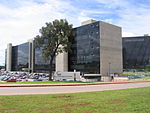Rio Branco Institute

The Rio Branco Institute (Portuguese: Instituto Rio Branco; Abbreviation: IRBr) is Brazil's diplomatic graduate school, internationally recognized as one of the best diplomatic academies in the world. It is the oldest government school in the country and the third oldest diplomatic training institution on the planet, located in Brasília. The institute was created on April 18, 1945, as part of the centennial celebration of the birth of the Baron of Rio Branco, the greatest and most important diplomat in the history of Brazil. The IRBr is run by the Ministry of External Relations of Brazil.Graduation from the IRBr is the only possible entrance point into the diplomatic career in Brazil.
Excerpt from the Wikipedia article Rio Branco Institute (License: CC BY-SA 3.0, Authors, Images).Rio Branco Institute
AFS 5, Brasília
Geographical coordinates (GPS) Address Phone number Website External links Nearby Places Show on map
Geographical coordinates (GPS)
| Latitude | Longitude |
|---|---|
| N -15.805277777778 ° | E -47.868611111111 ° |
Address
Instituto Rio Branco
AFS 5
70070-600 Brasília
Federal District, Brazil
Open on Google Maps










